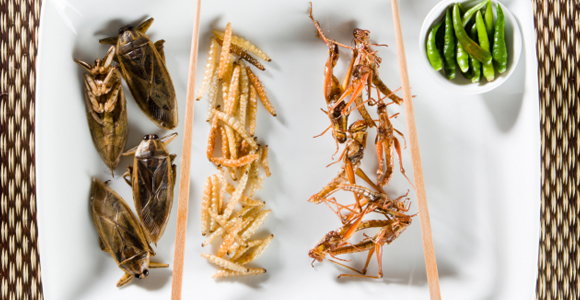New, exciting food trends are constantly emerging--tantalizing your taste buds and intriguing your mind. But did you ever think that unearthing a new food fad would literally come from under the earth itself? As strange as it may seem, insects are now gracing our plates with their presence.
A Healthy Dietary Staple
Consuming insects (scientifically termed entomophagy) is nothing new in other parts of the world. In fact, edible insects are a normal, dietary staple in many regions, with as many as two billion people around the world currently adding insects to their diets. Not only does the act of eating insects confer nutritional benefits, it's also extremely beneficial to the environment. In fact, just a couple months ago the Food & Agriculture Organization (FAO) of the United Nations (UN) released a report backing the notion that consuming insects may be one of the most vital aspects of food security in our near future. The report highlights the facts that insects provide beneficial nutrients, are easily accessible, emit fewer environmentally-damaging greenhouse gases, grow quickly and produce much more edible food per pound of feed when compared to cattle. Scientists believe consuming insects could play a major role in addressing food insecurity in the U.S.
Changing Attitudes on Eating Bugs
Researchers have been studying the positive nutritional and environmental impacts of eating insects for many years, but they now know that they must find ways to make them taste delectable in order for this trend to really gain legs (pun intended). In Western countries, many people still think that eating insects is unappetizing, and this thought needs to be changed large-scale for it to work. In many areas of the world, certain insects are considered a delicacy and people will pay top-dollar for them.
The Best Ways to Eat a Bug
For people brave enough to have tried eating insects, most have found them to work well in muffins, breads, dips and cookies. They're often served candied or covered in chocolate. Restaurants are hopping on the entomophagy train, too. Grasshopper tacos are being served up at a local Mexican restaurant in St. Louis, Mo. I've tried them and must say, they're pretty tasty. Perhaps you need a celebrity chef to whip up something scrumptious with insects in it to convince you. Luckily, several celebrity chefs are now including such options on their menus.
The Nutritional Value
Here's a breakdown of some of the nutrients that insects can provide (values are for a serving size of 100 grams):
Caterpillar: 28.2 grams protein
Cricket: 12.9 grams protein, 5.5 grams fat, 5.1 grams carbohydrate
Dung beetle: 17.2 grams protein, 4.3 grams fat, 0.2 grams carbohydrate
Giant water beetle: 19.8 grams protein, 8.3 grams fat, 2.1 grams carbohydrate
Grasshopper: 20.6 grams protein, 6.1 grams fat, 3.9 grams carbohydrate
June beetle: 13.4 grams protein, 1.4 grams fat, 2.9 grams carbohydrate
Red ant: 13.9 grams protein, 3.5 grams fat, 2.9 grams carbohydrate
Silkworm pupae: 9.6 grams protein, 5.6 grams fat, 2.3 grams carbohydrate
Termite: 14.2 grams protein
Weevil: 6.7 grams protein
To compare to more traditional sources of protein, note that a 100-gram serving size of lean ground beef contains about 27 grams of protein and a 100-gram serving of broiled cod provides a little over 28 grams of protein. According to the report from the UN's FAO, insects are not only an economical, environmentally-friendly source of high-quality protein, they're also high in minerals, including iron, copper, magnesium, phosphorus, manganese, zinc and selenium. Additionally, insects contain dietary fiber.
If you happen to see an insect-containing dish at a restaurant near you, I suggest you keep an open mind and try it. You may be surprised at how tasty these little creatures can really be.
Kari Hartel, RD, LD is a Registered, Licensed Dietitian and freelance writer based out of St. Louis, MO. Kari is passionate about nutrition education and the prevention of chronic disease through a healthy diet and active lifestyle. Kari holds a Bachelor of Science in Dietetics from Southeast Missouri State University and is committed to helping people lead healthy lives. She completed a yearlong dietetic internship at OSF St. Francis Medical Center in Peoria, IL, where she worked with a multitude of clients and patients with complicated diagnoses. She planned, marketed, and implemented nutrition education programs and cooking demonstrations for the general public as well as for special populations, including patients with cancer, heart disease, diabetes, Alzheimer's disease, obesity, and school-aged children. Contact Kari at [email protected].




